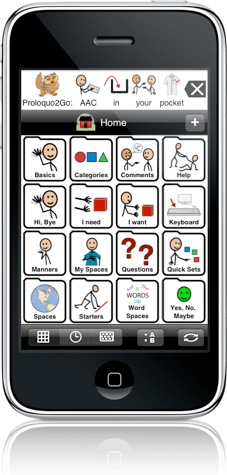 Apple recently announced the top selling apps, songs, games and podcasts from 2009 in an iTunes feature it called iTunes Rewind 2009. Perhaps surprisingly, one medical iPhone app made the list of the top 30 selling iPhone applications in 2009: Proloquo2Go. The app, which costs $189.999, appears among apps that generated the most revenue in 2009, which seems to be how Apple created a list of the Top Selling apps for the year.
Apple recently announced the top selling apps, songs, games and podcasts from 2009 in an iTunes feature it called iTunes Rewind 2009. Perhaps surprisingly, one medical iPhone app made the list of the top 30 selling iPhone applications in 2009: Proloquo2Go. The app, which costs $189.999, appears among apps that generated the most revenue in 2009, which seems to be how Apple created a list of the Top Selling apps for the year.
Here's how the app describes itself: "Proloquo2Go is a new product from AssistiveWare that provides a full-featured communication solution for people who have difficulty speaking. It brings natural sounding text-to-speech voices, up-to-date symbols, powerful automatic conjugations, a default vocabulary of over 7000 items, full expandability and extreme ease of use to the iPhone and iPod touch."
Other apps in the list include Major League Baseball, CNN, ESPN, AOL AIM, Family Guy and more. Proloquo2Go must have sold a number of apps to make the list -- even at number 23 of 30, it outsold ESPN, Family Guy and ESPN among tens of thousands of others. No small feat.
So how did a relatively obscure app rise above the rest? Perhaps one article from a major newspaper this fall helped out: Proloquo2Go was the focus of a New York Times feature, entitled Insurers Shun Multitasking Speech Devices, this past September:
"Kara Lynn has amyotrophic lateral sclerosis, or A.L.S., which has attacked the muscles around her mouth and throat, removing her ability to speak. A couple of years ago, she spent more than $8,000 to buy a computer, approved by Medicare, that turns typed words into speech that her family, friends and doctors can hear...
Still, advocates argue, advances in computing and easy-to use speech software have opened doors to use cheap mainstream alternatives. Indeed, the price drops have made it possible for A.L.S. assistance groups to buy dozens of netbooks, install specialized software like Proloquo2Go and lend them to clients."

For at least a brief time, Proloquo2Go became the face of Medicare and insurance reform for text-to-speech devices in the U.S. Following the feature, famed film critic Roger Ebert, a papillary thyroid cancer survivor, wrote the Times to criticize the insurance policy: “It’s stupid of insurance companies to insist on an inferior device costing 10 times as much,” he wrote.
Proloquo2Go certainly deserves the honor of being the top medical app for 2009 as the app clearly demonstrates the disruption wireless health devices and apps are beginning to create. Time will tell if and when that disruption will translate into a more informed reimbursement policy.













